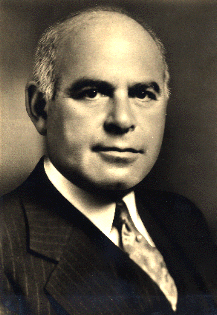Columbia University Libraries Announces the Availability of Lehman Digital Archive
NEW YORK, April 17, 2008 Columbia University Libraries is pleased to announce the online publication of the complete Special Correspondence Series of the Herbert H. Lehman Papers collection. This online database includes some 32,890 complete documents (over 43,000 scanned page images) presented in a simple but powerful Web interface that facilitates browsing, searching and navigation. It is available to the public for educational and research purposes at: www.columbia.edu/library/lehmanonline

The Lehman Special Correspondence Series provides an extraordinary overview of the political and personal life of Herbert H. Lehman (1878-1963), four-term Governor of New York, from 1933 to 1942, and U.S. Senator from 1949 until 1957. As Governor, Lehman was a supporter of Roosevelt's New Deal and helped implement similar policies in New York State. As U.S. Senator he remained a stalwart liberal Democrat, supporting President Truman and becoming a vocal critic of McCarthyism. Lehman also made significant contributions to overseas refugee relief efforts during World War II, working first for the State Department and later as director general of the United Nations Relief and Rehabilitation Administration.
Available in the new online archive are letters to and from Lehman and over nine hundred contemporaries including presidents, senators, politicians, foreign leaders, and members of Jewish and philanthropic organizations. The Web site provides a documentary overview of Lehman’s life and career and is an excellent starting point for research within the full Herbert H. Lehman Papers collection, consisting of more than 1.2 million items. The Lehman Papers and related collections are part of Columbia’s Rare Book and Manuscript Library and are findable within the Libraries’ new Archival Collections Portal (http://www.columbia.edu/cu/lweb/archival/)
Columbia University Libraries has published the Lehman site for the benefit of students and scholars in furtherance of its mission to support teaching and research. The online archive also serves as a demonstration project that will allow libraries and archives to study the benefits and challenges of digitizing unique archival collections. According to Stephen Paul Davis, director of Columbia's Libraries' Digital Program, the Lehman papers initiative has opened up new avenues for thinking about the future of collection digitization. "Scholars at Columbia and elsewhere will now for the first time have searchable, full-text access to this significant archival collection and will be able to trace people and topics through it in a way never before possible. Now that we have completed a project of this nature and understand the issues and costs, we are in a much better position to consider the benefits and feasibility of digitizing more of our unique archives.”
The Lehman Special Correspondence Series is a joint initiative of the Libraries' Digital Program Division, the Preservation and Digital Conversion Division, and the Rare Book and Manuscript Library.
Columbia University Libraries/Information Services is one of the top five academic research library systems in North America. The collections include over 10 million volumes, over 100,000 journals and serials, as well as extensive electronic resources, manuscripts, rare books, microforms, maps, graphic and audio-visual materials. The services and collections are organized into 25 libraries and various academic technology centers. The Libraries employs more than 550 professional and support staff. The website of the Libraries at www.columbia.edu/cu/lweb/ is the gateway to its services and resources.
The Rare Book & Manuscript Library owns over 500,000 rare books in some 20 book collections and almost 28 million manuscripts in nearly 3,000 separate manuscript collections. It is particularly strong in English and American literature and history, classical authors, children’s literature, education, mathematics and astronomy, economics and banking, photography, the history of printing, New York City politics, librarianship, and the performing arts. Individual collections are as eclectic as they are extensive. For more information, please see: www.columbia.edu/cu/lweb/indiv/rbml/index.html.
The Columbia Libraries’ Digital Program Division (LDPD) was established in 2002 to carry out planning, implementation and coordination of digital projects and services for Columbia University Libraries. The Division coordinates Columbia's collection-digitization initiatives, provides technology support and hosting for major scholarly databases, develops enhanced end-user interfaces and tools for discovery of and access to the Libraries' licensed electronic resources, manages Columbia's institutional repository and digital preservation programs, and provides technology and design support for the Libraries' public and internal web sites. More information may be found at: www.columbia.edu/cu/libraries/inside/units/ldpd/.
Established in 1974 with responsibility for preserving Columbia University Libraries’ collections in all formats and genres, the Preservation and Digital Conversion Division added digital conversion to its regular operations in 1995. The Division provides a comprehensive program to prolong the existence and accessibility of the collections for current and future students and scholars, by acting to prevent or retard deterioration of physical materials through correct housing and environment; where possible, to improve their condition through conservation treatment; and, as necessary, to change their format in order to preserve their intellectual content, including conversion of analog content to digital form. The Division participates in establishing technical standards for creating digital content and for the accompanying metadata. More information about the Division can be found at www.columbia.edu/cu/lweb/services/preservation.